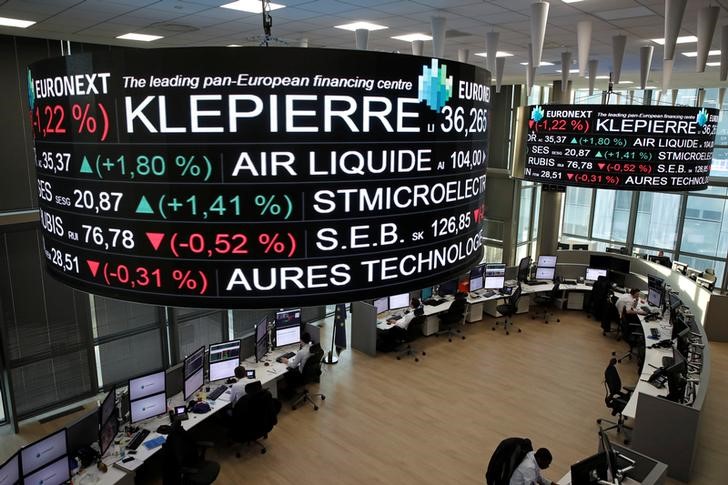* Stocks waver after three days of losses
* World stocks set for weekly loss despite record inflows
* Mueller investigation adds to U.S. political worries
* White House shake-up reports weigh on dollar
* Graphic: World FX rates in 2018 http://tmsnrt.rs/2egbfVh
By Danilo Masoni
MILAN, March 16 (Reuters) - World stocks wavered and the dollar eased on Friday as turmoil in the Trump administration kept markets watchful at the end of a week scarred by concerns that U.S. tariffs could provoke a trade war.
The MSCI All-Country World index .MIWD00000PUS , which tracks 47 countries, was flat after three straight sessions of losses and was set for a weekly fall of around 0.6 percent.
European shares found some support in dealmaking activity although the STOXX 600 .STOXX was on track for a 0.3 percent weekly loss. That followed losses in Asia and in the U.S. overnight, while stock index futures pointed to a flat open for Wall Street ahead of the release of some macroeconomic data. 500 futures ESc1 were up 0.05 percent.
The New York Times reported that U.S. Special Counsel Robert Mueller had issued a subpoena for documents, including some concerning Russia, related to President Donald Trump's businesses. isn't giving markets much respite," said Rabobank analyst Bas van Geffen in a note. "While still vague at best, the subpoena does bring the investigation yet another step closer to the president. Markets certainly didn't like the added uncertainty."
Although world equities were set for a weekly loss, huge inflows helped limit the decline. According to figures from flows tracker EPFR cited by BAML, a record $43.3 billion was driven into equities this week.
"Markets have been buoyed by strong inflows, but I think the under current in terms of news on the trade front is quite poor and I don't think it has played out yet," said Gautam Batra, head of investments at Mediolanum Asset Management.
The Washington Post reported Trump has decided to remove H.R. McMaster as his national security advisor. follows the departures of Secretary of State Rex Tillerson and top economic adviser Gary Cohn, adding to concerns about the implications for U.S. policy.
The developments, together with a report earlier this week that Trump is seeking to impose tariffs on up to $60 billion of Chinese imports, cemented investors' worries that the administration is increasingly leaning towards protectionism. House trade adviser Peter Navarro has said that Trump would get options in the coming weeks to address China's "theft and forced transfer" of American intellectual property as part of an investigation.
"The key here is whether the main battle ground of the trade war will reach IT digital products," said Hiroshi Watanabe, economist at Sony Financial Holding.
The U.S. administration is negotiating to revamp the North American Free Trade Agreement and last week announced the imposition of tariffs on steel and aluminium imports, which have weighed on shares in some European steelmakers and industrial companies. Trump has offered exemptions from the tariffs to NAFTA members Canada and Mexico.
A phone call between U.S. Commerce Secretary Wilbur Ross and European Trade Commissioner Cecilia Malmstrom to resolve the tariff dispute failed to bring results as they agreed to meet next week, a source said. that the tariffs could disrupt synchronised global growth dwarfed recent strong economic data, including a fall in U.S. jobless claims. currency markets, reports of the possible removal of U.S. security adviser McMaster weighed on the dollar, sending it to its lowest level against the yen since early March. The euro traded up 0.14 percent at $1.232 EUR= , having slipped 0.5 percent the previous day.
The dollar index .DXY , which measures the greenback against a basket of six other major currencies, was down 0.17 percent at 89.986, easing after two days following remarks from incoming White House economic adviser Larry Kudlow who said he would like the dollar to be stronger. in the dollar helped copper prices recover from early falls, as a weaker dollar makes metals cheaper for holders of other currencies. Three-month copper on the London Metal Exchange CMCU3 was up 0.57 percent at $6,960 a tonne.
Oil prices edged up but were set to fall this week on concerns among investors about rising supply from the United States and elsewhere threatening to undermine efforts by OPEC and other producers to tighten the market. futures LCOc1 rose 0.17 percent at $65.23 per barrel.
Southern European government bonds outperformed their higher-rated peers as another ECB policymaker warned that inflation in the euro zone is still proving elusive, a potential hurdle to the withdrawal of monetary stimulus. euro zone bond yields also dipped. Germany's 10-year bond touched a fresh five-week low of 0.57 percent. DE10YT=RR
U.S. Treasuries yields inched up to 2.829 percent US10YT=RR after having hit a near two-week low of 2.797 percent on Thursday. The two-year yield US2YT=RR eased after hitting a 9 1/2-year high of 2.295 percent as investors prepared for a widely expected interest rate increase by the Federal Reserve next week.
<^^^^^^^^^^^^^^^^^^^^^^^^^^^^^^^^^^^^^^^^^^^^^^^^^^^^^^^^^^^ World stocks
http://reut.rs/2pgTjNA Dollar index retreats
http://reut.rs/2FHjZ4c
^^^^^^^^^^^^^^^^^^^^^^^^^^^^^^^^^^^^^^^^^^^^^^^^^^^^^^^^^^^>
